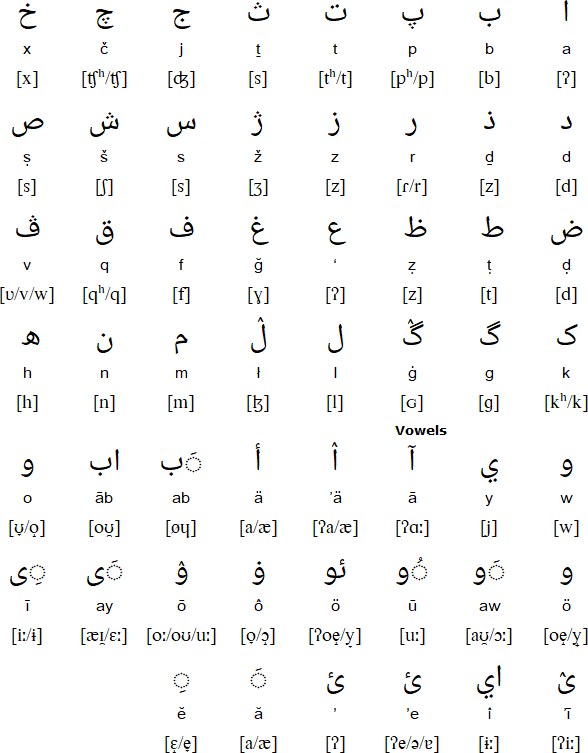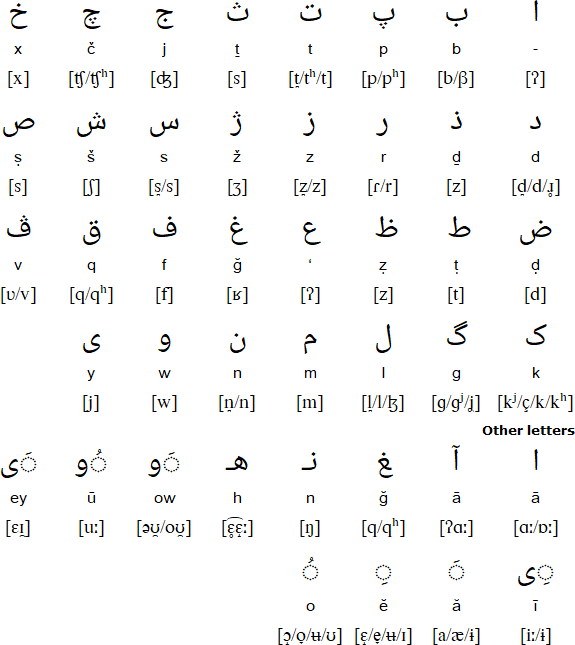Luri is a collection of Western Iranian dialects spoken mainly in Iran, and also in Oman. Luri has four dialect groups: Northern Luri, Kumzari, Bakhtiâri and Southern Luri. These groups are similar to Persian, and the Bakhtiâri dialect is transitional between Kurdish and Persian.
Northern Luri (زۊن لٛوْری) is spoken in Ilam, Hamadan, Khuzestan, Lorestan and Markazi provinces of western Iran. In 2014 there were 1.76 million speakers of Northern Luri, which is also known as Lori, Luri or Luristani. It is used on the radio and on TV, and there is a dictionary and grammar of Northern Luri.
Bakhtiâri (بختیاری) is spoken in Khuzestan, Chaharmahal and Bakhtiari, Lorestan, Kohgiluyeh and Boyer-Ahmad, Isfahan and Markazi provinces of western Iran. In 2014 there were about 1.17 million speakers of Bakhtiâri, which is also known as Lori, Luri or Lori-ye Khaveri. There is some literature in Bakhtiâri.
Kumzari is spoken mainly in Musandam Governorate in northern Oman. There were 5,100 speakers there in 2017, and there were another 700 speakers in Homozgan province in southern Iran in 2011. Kumzari is also known as Kumzai, Laraki or Komzari.
Southern Luri (لُرِىْ بُزُ رْگْ) is spoken in Kohgiluyeh and Boyer-Ahmad Fars, Khuzestan, Bushehr provinces of western Iran. In 2014 there were about 1 million speakers of Southern Luri, which is also known as Lor, Lori, Lori-ye Jonubi, Lur or Ruliy Luri. There is some literature in Southern Luri, and it is also used on the Radio.


Download alphabet charts for Luri (Excel)
Further details of the Luri alphabets (PDF, in German, provided by Wolfram Siegel)
بيارهٱمنٱبؽئنبيارئوبؽئنتٱئشپاكهڤنو. نيم ئوچارئو چارسائٱت نٱزيكياهوفتيئيمايما كٱردنئوڤسۊرئٱت هٱمٱخۏشۉنٱآمادٱ گرد ٛانسىرٱئتنويرٱقوْٛلٛ.
Īmā hoft-ī-Īm nezīk-yā sāat-e čār ö čār ö nīm. vano ke pā taš b-ī-n ö biār b-ī-n hama-ne biār kerd-en ö ve sörat hama xo-šōn-e āmāda kerd-en sī ḥarekat ve taraf-e kola.
We slept until close to four or four-thirty. Those who were around the fire and who were awake awakened everyone and we quickly made ourselves ready to set out for the ambush.
Information supplied by Mohammad Mogoei, Michael Peter Füstumum and Wolfram Siegel
Source: https://fa.wikipedia.org/wiki/زبان_لری
Information about Luri
https://en.wikipedia.org/wiki/Luri_language
https://www.ethnologue.com/language/lrc
https://www.ethnologue.com/language/bqi/25
https://www.ethnologue.com/language/zum/25
https://www.ethnologue.com/language/luz
https://www.academia.edu/Documents/in/Luri_Language
http://www.iranicaonline.org/articles/lori-dialects
Avestan, Bactrian Baluchi, Bartangi, Dari, Gilaki, Hazaragi, Ishkashimi, Judeo-Persian, Juhuri, Khufi, Kumzari, Kurdish, Luri, Mazandarani, Munji, Ossetian, Ormuri, Oroshor, Persian, Parthian, Pashto, Rushani, Sanglechi, Sarikoli, Shabaki, Shughni, Tajik, Talysh, Tat, Wakhi, Wanetsi, Yaghnobi, Yazghulami, Yidgha, Zazaki
Adamaua Fulfulde, Afrikaans, Arabic (Algerian), Arabic (Bedawi), Arabic (Chadian), Arabic (Egyptian), Arabic (Gulf), Arabic (Hassaniya), Arabic (Hejazi), Arabic (Lebanese), Arabic (Libyan), Arabic (Modern Standard), Arabic (Moroccan), Arabic (Najdi), Arabic (Sudanese), Arabic (Syrian), Arabic (Tunisian), Arwi, Äynu, Azeri, Balanta-Ganja, Balti, Baluchi, Beja, Belarusian, Bosnian, Brahui, Chagatai, Chechen, Chittagonian, Comorian, Crimean Tatar, Dargwa, Dari, Dhatki, Dogri, Domari, Gawar Bati, Gawri, Gilaki, Hausa, Hazaragi, Hindko, Indus Kohistani, Kabyle, Kalkoti, Karakalpak, Kashmiri, Kazakh, Khowar, Khorasani Turkic, Khwarezmian, Konkani, Kumzari, Kurdish, Kyrgyz, Lezgi, Lop, Luri, Maguindanao, Malay, Malay (Terengganu), Mandinka, Marwari, Mazandarani, Mogholi, Morisco, Mozarabic, Munji, Noakhailla, Nubi, Ormuri, Palula, Parkari Koli, Pashto, Persian/Farsi, Punjabi, Qashqai, Rajasthani, Rohingya, Salar, Saraiki, Sawi, Serer, Shabaki, Shina, Shughni, Sindhi, Somali, Soninke, Tatar, Tausūg, Tawallammat Tamajaq, Tayart Tamajeq, Ternate, Torwali, Turkish, Urdu, Uyghur, Uzbek, Wakhi, Wanetsi, Wolof, Xiao'erjing, Yidgha
Page last modified: 11.12.22
[top]
You can support this site by Buying Me A Coffee, and if you like what you see on this page, you can use the buttons below to share it with people you know.

If you like this site and find it useful, you can support it by making a donation via PayPal or Patreon, or by contributing in other ways. Omniglot is how I make my living.
Note: all links on this site to Amazon.com, Amazon.co.uk
and Amazon.fr
are affiliate links. This means I earn a commission if you click on any of them and buy something. So by clicking on these links you can help to support this site.
[top]